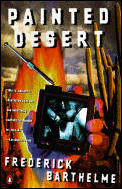 This book review was originally published on Critics’ Choice on September 25, 1995.
This book review was originally published on Critics’ Choice on September 25, 1995.
Incensed by the grotesque television images of the Rodney King riots and the Nicole Brown/Ron Goldman murders, two avid media watchers decide they’re going to perform some reconstructive surgery on the nation’s attitude. Junior college professor Del Tribute and his cyberjournalist friend Jen pick as their first target Damian Williams, the black youth who nearly killed Reginald Denny and spray-painted an immigrant’s penis black on TV.
Only as the couple begin the cross-country trek from their home of Mississippi to Los Angeles, something peculiar and Disneyesque begins to happen. They become absorbed in the tourist traps of the American southwest and captured by the plucky resolve and common decency of folk that live beyond the reaches of the New York Times and CNN and Time/Warner and Microsoft. From the quirky commercialization of the Carlsbad Caverns to the flat-out weirdness of the multiple UFO museums and exhibits along the way, Del and Jen see that there’s hope for the people of America yet.
But one problem remains: what do they say to Durrell Dobson, Jen’s mysterious Internet penpal who’s taken their cultural vendetta to heart and just might proceed on his own?
Painted Desert, Frederick Barthelme’s sixth novel and a pseudo-sequel to his acclaimed The Brothers, offers a thoughtful road trip through the psyche of America. Barthelme has plugged in to the currents of frustration that run through us all these days and provided us with some much-needed grounding. It’s a book of immediacy that takes its subject matter from today’s headlines and breaking reports.
Most chilling is Barthelme’s portrait of the digital underground, the sinuous Internet dwellers that e-mail messages of doom and gloom across cyberspace and download AP stories by the dozen from CompuServe to backup their government conspiracy theories. (Barthelme himself is a not-infrequent contributor to cyberculture.) With anywhere from 10 to 50 million Americans already “plugged in,” Barthelme wisely points out that the fringe elements of society have come all that much closer to our daily lives.
But Frederick Barthelme is no Don DeLillo; call him DeLillo Lite. Unlike the works of DeLillo and other urban prophets of doom like Thomas Pynchon and Paul Auster, Painted Desert doesn’t really deal with the outsiders of our society; it deals with the insiders that delude themselves into believing that they’re on the outside. Although in the end, that might be just as dangerous a subject.